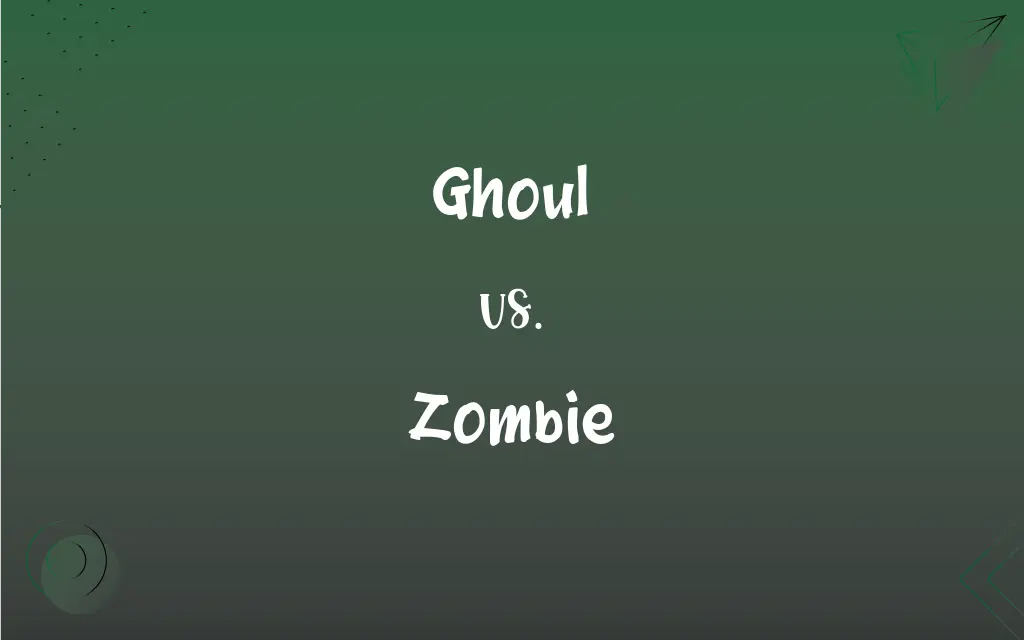Ghoul vs. Zombie: What's the Difference?
Edited by Aimie Carlson || By Harlon Moss || Updated on October 15, 2023
Ghouls are mythical creatures eating the dead; zombies are reanimated corpses with no will.

Key Differences
A ghoul is traditionally a creature from ancient Arabian folklore, known to inhabit graveyards and consume human flesh. Conversely, a zombie is essentially a reanimated corpse, typically depicted as void of consciousness and self-awareness, operating solely on the most basic instinct for survival which often includes cannibalism.
Ghouls are often characterized by their cunning and shapeshifting abilities, setting them apart from zombies. Zombies, however, are often portrayed in modern culture as victims of an epidemic, virus, or sorcery, void of any intelligence or cunning, and exhibit pack behavior.
The ghoul's origins lie in folklore and religious texts, often associated with the consumption of human flesh and grave-robbing. In contrast, the concept of a zombie has its roots primarily in Haitian Voodoo, where it is believed they are corpses reanimated by magic, with variations in other African and Caribbean folklore.
Ghouls, in literature and media, often retain a level of intelligence and are sometimes depicted as capable of speech and complex thought, making them formidable predators. Zombies, on the other hand, are typically depicted as operating on basic instincts with little to no evidence of complex thought or reasoning, making them more predictable.
In summary, while ghouls are often depicted as intelligent and sometimes supernatural beings with a ghastly diet, zombies are generally portrayed as reanimated corpses, devoid of intellect and consciousness, driven by an insatiable hunger for human flesh.
ADVERTISEMENT
Comparison Chart
Origin
Middle Eastern folklore
Haitian Voodoo
Cognitive Ability
Intelligent, cunning
Low or non-existent
Speech
Often capable
Generally incapable
Behavior
Solitary, predatory
Herd-like, aggressive
Depiction
Shape-shifter, flesh-eater
Reanimated, mindless
ADVERTISEMENT
Ghoul and Zombie Definitions
Ghoul
A ghoul can refer to someone who robs graves.
The police arrested the ghoul after catching him in the act.
Zombie
A zombie can refer to a person who is or appears lifeless, apathetic, or completely unresponsive to their surroundings.
After pulling an all-nighter, he felt like a zombie.
Ghoul
A ghoul can describe someone morbid or obsessed with death.
He was often called a ghoul for his dark, unsettling artwork.
Zombie
A zombie is a reanimated corpse believed to be revived by witchcraft.
The zombie staggered through the dark streets.
Ghoul
A ghoul is a mythical creature that consumes human flesh.
In the story, the ghoul lurked in the shadows of the cemetery.
Zombie
In Haitian folklore, a zombie is a dead body reanimated through magical means.
The villagers feared the sorcerer's power to create a zombie.
Ghoul
In folklore, a ghoul is a demon-like being that preys on young children.
Parents warned their kids about the ghoul that hunts in the woods.
Zombie
A zombie can refer to a computer controlled by another person without the owner's knowledge.
Hackers used a zombie to launch the attack.
Ghoul
In modern horror, a ghoul is an undead creature that feasts on corpses.
The adventurers faced a ghoul in the ancient crypt.
Zombie
In popular culture, a zombie is an undead creature typically craving human flesh.
Zombies overwhelmed the city in the movie.
Ghoul
An evil spirit or demon in Muslim folklore believed to plunder graves and feed on corpses.
Zombie
In voodoo belief and popular folklore, a corpse that has been reanimated, especially by means of a supernatural power or spell.
Ghoul
In popular folklore, an undead or subhuman being, especially one that eats human flesh.
Zombie
One who looks or behaves like an automaton.
FAQs
Do ghouls have supernatural powers?
In folklore, they often have abilities like shape-shifting.
What is the origin of the word "ghoul"?
It's from the Arabic "ghul," meaning to seize.
What causes a person to become a zombie?
In fiction, causes range from viruses to voodoo magic.
Are zombies fast or slow?
Depictions vary; they range from slow-moving to fast and agile.
Can a ghoul be intelligent?
Yes, ghouls are often depicted as cunning and intelligent.
Do ghouls appear in modern media?
Yes, in various forms across literature, film, and video games.
Can a zombie be controlled?
In some lore, they're controlled by a sorcerer or the cause of their reanimation.
Is the concept of a ghoul limited to any culture?
It originated in Middle Eastern folklore but has global recognition now.
Do zombies have any awareness?
Usually, they're depicted as having no self-awareness or emotions.
Are ghouls immortal?
Folklore and fiction do not commonly portray ghouls as immortal, but their lifespans can be ambiguously long.
Are ghouls and zombies considered undead?
Yes, both are often categorized as undead beings.
Can zombies speak?
Generally, no, they're often portrayed as incapable of speech.
What do ghouls eat?
They're known for consuming human flesh or corpses.
How do you kill a zombie in popular culture?
Often by destroying the brain.
Are ghouls solitary or do they live in groups?
They're typically depicted as solitary creatures.
Are ghouls evil?
They're typically depicted as malevolent in nature.
Are zombies always depicted as mindless?
Typically, yes, they're usually shown as lacking consciousness and free will.
Where did the modern concept of zombies originate?
It's largely derived from Haitian Voodoo.
Can ghouls take the form of those they've consumed?
Folklore often attributes them with such shape-shifting abilities.
Can zombies reproduce?
Traditional lore and popular culture do not typically depict zombies as being able to reproduce.
About Author
Written by
Harlon MossHarlon is a seasoned quality moderator and accomplished content writer for Difference Wiki. An alumnus of the prestigious University of California, he earned his degree in Computer Science. Leveraging his academic background, Harlon brings a meticulous and informed perspective to his work, ensuring content accuracy and excellence.
Edited by
Aimie CarlsonAimie Carlson, holding a master's degree in English literature, is a fervent English language enthusiast. She lends her writing talents to Difference Wiki, a prominent website that specializes in comparisons, offering readers insightful analyses that both captivate and inform.































































